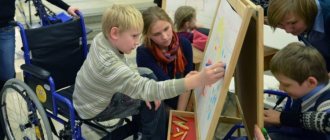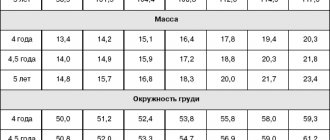Individual educational route for a preschooler as determined by the Federal State Educational Standard
An individual approach to a child’s personality is the basic principle of the Federal State Educational Standard. The principle of priority of the child’s interests was defined by the researchers as “being on the child’s side.” The reason for the difficulties experienced by a child in development should be sought both in the personality of the child himself and in the adults around him, who are directly responsible for the social environment in which the little person grows up. In real life, the child is often the only one on his side. At the same time, he often turns out to be helpless and defenseless in the face of circumstances, so it is important in any problematic situation to hear the child, understand and help him.
The foundation of the modern standard of preschool education was based on the principle of pedagogy of an individual approach and the developmental concept of education. Indicated in the following paragraphs:
- clause 1. 6. - formulation of tasks that concentrate around the creation of optimal conditions for the formation and development of the child’s personality, as well as the disclosure of his creative potential in accordance with his age, psycho-emotional and physiological characteristics, individual abilities and inclinations, and the specifics of the social environment. The child is considered as a valuable subject of relationships with himself, the people around him and the outside world.
- clause 1. 4. - contains the principles of the Federal State Educational Standard, the key of which is the provision on the implementation of an individual approach to the educational needs of each child.
- paragraph 2. 10. 2. - the methods of organizing and coordinating children's initiative and spontaneous activity in the spirit of creative activity are clarified.
- clause 3. 2. 1. - professional selection of forms and methods of pedagogical work that are relevant to the age and individual needs of the child.
- clause 3. 2. 3. - patronage of the child, development of an individual development roadmap, pedagogical and psychological correction of identified problems.
- paragraph 3. 2. 5. - a developmental concept of education aimed at the short-term development of the student.
An individual approach refers to the management of a child’s development, based on a deep, multifaceted study and understanding of the complexity of his inner world and social conditions of life.
Identification of capable children is carried out on the basis of observation, communication with parents, study of individual characteristics
The principle of individual approach pedagogy is not to change the content of education in the interests of a particular child, but to adapt pedagogical methods and techniques to his personal characteristics. For the educational process to be successful, it is necessary to take into account the difficulties that the child experiences and the pace at which he acquires knowledge, skills and abilities. In this case, a model of fruitful partnership between a child and a teacher is being implemented, since the child and parents retain the right to choose the most suitable educational methods from those proposed by specialists.
An individual educational route is a personal way to realize the intellectual, emotional, spiritual potential of a preschool child’s personality. The goal is to create favorable conditions that stimulate activity and the development of the child’s creative and intellectual powers. The teacher’s task is to ensure a competent professional selection of the content of educational, psychological and physical activity, as well as forms and methods of work that meet the individual needs of the child.
Video: individualization of preschool education
Criteria that determine the objectives of an individual development strategy:
- the current level of development of the child’s abilities;
- the degree of his readiness for educational activities;
- individual educational goals and objectives for the near future.
IOM tasks, review and approval procedure
Individual educational routes are designed:
- for problem children who experience difficulties in the process of mastering the general education program for preschoolers and need correctional assistance from specialists;
- for pupils with disabilities, disabled children;
- for gifted children with a level of ability exceeding average regulatory educational standards.
The purpose of the individual educational route is to solve the problem of accessibility of preschool institutions for children with disabilities
Leading tasks of an individual educational route:
- provide support and assistance in self-development and mastering the preschool education program;
- to form in the child an initial level of learning ability, i.e. teach him to understand the educational task, plan his educational activities, concentrate on completing the exercise, develop self-discipline and volitional qualities;
- develop and improve movement coordination skills, development of gross and fine motor skills;
- to form and consolidate general cultural, everyday, hygienic, communicative foundations of behavior;
- to accustom the child to manipulative-objective, sensory, practical, play activities, to develop skills in the productive area (drawing, modeling, appliqué);
- develop speech - emotional intonation, grammatical structures, speech mechanisms;
- to generate knowledge about the natural environment and the world of social relations;
- form ideas about spatio-temporal and quantitative categories.
Methodological tools that are used in the passage of an individual development trajectory:
- role-playing and outdoor games, classes in the form of conversation and dialogue, reading and discussion of literary works, small improvisation sketches that enhance the emotional component of information perception;
- psychological trainings and game exercises that help relaxation, neutralize fears, reduce anxiety and aggression, improve behavioral sphere, as well as social and communication skills;
- exercises to develop thinking, imagination, speech, memory;
- use of art therapy techniques (treatment with art, fairy tales, doll making).
Individual attitude and an integrated approach to the problem of development are the key to success even in the most difficult situation!
Development and adoption of the IOM
To create an individual educational route, it is first necessary to conduct a diagnostic study to find out the level of psycho-emotional, intellectual, communicative, social and physical development of the child. The diagnostic results are presented to the teachers' council, which subsequently recommends that the children be examined by specialists from the PMPK (psychological, medical and pedagogical council).
Sample for the conclusion and recommendations of the PMPC
| FULL NAME. child |
| Date of Birth |
| Family information: Mother (full name, education, place of work) |
| Father (full name, education, place of work) |
| Teachers (full name): |
| Specialists: Speech therapist teacher: Speech pathologist teacher: Educational psychologist: Music director: Senior nurse: |
| Health group |
| Regime of a child’s stay in a preschool educational institution |
| Conclusion of the PMPC |
| PMPC recommendations |
| Long term goals |
| Goals for the current period (academic year) |
The council compiles a list of children for whom the development of an individual educational work plan is relevant.




